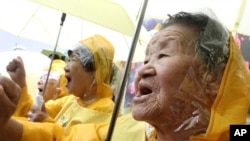All across Asia, as in other parts of the world, there is state of denial with respect to rape in times of war. Plain and simple, it is a war crime. And yet it is very much ignored or belittled. The first international treaty, the Rome Statute, identifies crimes against women as crimes against humanity and considers them war crimes.
So why is the issue so much in contention? From Indonesia, to Bangladesh, India, Japan, China, women and their families are left to pick up the pieces of their lives and try to heal and move forward. And yet the very thing that would help, a simple apology, is so ever elusive.
Marcia Jacobs, a psychotherapist and rape survivor, tells VOA's Frances Alonzo how vital an apology is to healing as well as her own experience as a rape survivor and how she moved past the experience to help others.
JACOBS: I started to see that I had something to offer, and on a very large level, started to give back. You often see, like in rape relief centers, most of the people who work there have been rape victims. So, we find a way to reconnect with our community.
ALONZO: With regard to the shame and blame, how can the community rally around young victims and help the child survivor of rape?
JACOBS: It really is the mother and the father who will be the ones that will make a huge difference for a small child because that’s their world. They don’t have the school and the community yet. To really help families, what’s important is to be aware of that tendency and to not allow it to be expressed, to just put it aside and just with open arms embrace that child and shield that child and really reassure that child that “this is horrible and it happened, but you’re going to be okay.”
I did some work in Indonesia in 1998 following the uprising in Jakarta against the targeted ethnic Chinese population. I went there to train some groups to work with families where children and adults were raped. There were hundreds and thousands of women activists in that country who were nuns, who were teachers, who were ordinary housewives, who were students, who rallied to be with these children and adults. They had this wonderful program called accompaniment program and all they did was sit with people. Like, “you are not alone, I have your hand in mine and I am here to comfort you.”
ALONZO: So now, in the case of the Japanese comfort women, which you know happened decades ago. How important is it for them to get this public apology? What does that do?
JACOBS: It’s everything. Not because it makes the past go away, and not because it can ever really compensate them. The numbers of comfort women who died because of what happened to them in the camps, nothing can make that go away. But, the acknowledgement is that they move from private shame to public dignity. There are statues being erected of these women in some cities around the world. They have become a symbol of courage. They have become a symbol of the injustice in the world. You can just imagine what that means when we feel defiled, dirty, damaged, bad, forgotten and lost, to, someone can stand up tall.
It is extremely important and the hedging that’s going on about that, like the apologies, and it’s retracted, then sort of make a semi-apology. I always really wondered, why does it cost so much to apologize? Why is it so difficult to apologize? You know it’s politics, it’s misogyny, it’s a whole of different things. But it makes a tremendous difference and if the governments or the institutions that perpetrated the abuse won’t apologize, then groups of people and communities within that culture can apologize and also make a difference.
ALONZO: So you mean, not necessarily the government themselves but the public at large, the community can come forward and say “we apologize for the actions of our military back then and the actions of our government.”
JACOBS: Exactly. And you know, one of the really important issues in the apology is that it moves it out of denial. It puts the responsibility where it belongs. When people are silenced, they are cut off from the community. And there is no healing possible. Because healing is really a connection or reconnection with community, with future, with moving forward and every person in the community who gives a voice really does matter. Go for the government apology, go for the institutional apology. But as we’ve seen, very often it’s just you and I and the little people, who, might be the voices that are that tipping point to a real change, to a change in systemic rape as a weapon of war.





